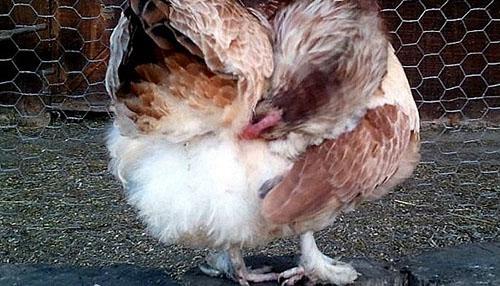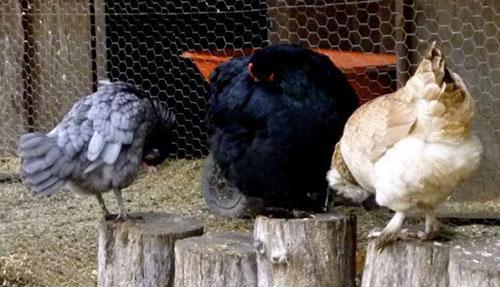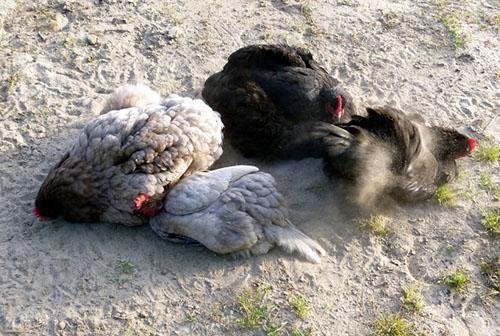Ticks in chickens - prevention and treatment with natural remedies
 Ticks are tiny parasites that crawl along the surface of the skin. They will become a real problem if they start with birds in your chicken coop. Sources of infection can be already sick chickens, as well as wild birds and rodents. In addition, ticks can catch on shoes or clothing, and thus enter the coop. These parasites are active during the warm season, especially in summer, but some species are able to survive in cold climates. Although the life cycle of ticks is very short - only 5-7 days, during this time each parasite can lay more than 100,000 eggs. Therefore, for the complete recovery of animals, treatment courses must be repeated for some time.
Ticks are tiny parasites that crawl along the surface of the skin. They will become a real problem if they start with birds in your chicken coop. Sources of infection can be already sick chickens, as well as wild birds and rodents. In addition, ticks can catch on shoes or clothing, and thus enter the coop. These parasites are active during the warm season, especially in summer, but some species are able to survive in cold climates. Although the life cycle of ticks is very short - only 5-7 days, during this time each parasite can lay more than 100,000 eggs. Therefore, for the complete recovery of animals, treatment courses must be repeated for some time.
Signs of ticks in chickens

If your chickens suddenly become reluctant to enter the chicken coop in the evening, or have stopped using nesting places, this is a sure sign that they have ticks.
 Chickens love to take dust baths in dry areas of soil or sand. If you add a little wood ash or diatomaceous earth (it is sold in packages) there, then this will be a good prevention of tick infestation. However, often in very hot and humid areas where the mite population thrives, or during periods of prolonged rains when chickens do not have the opportunity to take dust baths, this method still does not help to escape from parasites.
Chickens love to take dust baths in dry areas of soil or sand. If you add a little wood ash or diatomaceous earth (it is sold in packages) there, then this will be a good prevention of tick infestation. However, often in very hot and humid areas where the mite population thrives, or during periods of prolonged rains when chickens do not have the opportunity to take dust baths, this method still does not help to escape from parasites.
Cleaning the plumage too often and plucking feathers can be a sign of a parasite infestation.
If your chickens have ticks, you will probably notice that they are more likely to clean feathers and pinch feathers under the wings and around the anus. On closer inspection, you can see tiny red or black specks near the anus, and when you look at the chicken coop, you will find red streaks of blood or black grains on the perch that you feel when you run your hand over the surface.
Ways to deal with ticks
There are several chemical solutions and preparations on the market to combat ticks, but most of them have not been tested in chickens, so experienced owners do not advise using them immediately. It is best to try a comprehensive natural treatment first.
Spray the coop and perches for several days in a row with the following mixture: 2 cups of water, 1 cup of vegetable oil, and 1 tablespoon of dishwashing liquid. This mixture will help kill the mites. Shake well before use, so it exfoliates. The chicken coop should be treated at least 1-2 times a week for several weeks in parallel with the treatment of chickens. This 100% natural homemade spray will help get rid of mites in your chicken coop
You can spray a layer of diatomaceous earth on the floor of the chicken coop and nesting area, and rub the mixture onto the surface of the perches. The processing is repeated as necessary.
 Wormwood (Artemisia) is another effective natural remedy for tick control. Tie bunches of wormwood to roosts, spread sachets over nesting sites, or hang cut plants all over the coop. This is a great remedy that you can always use to repel ticks.
Wormwood (Artemisia) is another effective natural remedy for tick control. Tie bunches of wormwood to roosts, spread sachets over nesting sites, or hang cut plants all over the coop. This is a great remedy that you can always use to repel ticks.
Garlic Juice Combined with Plant Essential Oils - Proven Against Ticks
To cure chickens, spray them with a garlic juice spray. Poultry scientists in the UK have discovered that this product can kill 100% of all ticks in 24 hours. It can be used to treat birds and as a prophylactic agent.
To make this natural spray, you need:
- 300 ml water
- 30 ml garlic juice
- 1 teaspoon (total) of any combination of these essential oils - bay leaf, cinnamon, clove, coriander, lavender, mint and / or cumin.
Mix all the ingredients well in a spray bottle and spray the chicken twice a week for prophylaxis, or every other day for 2-3 weeks for tick infestations. Pay particular attention to the areas around the anus and under the fenders. After spraying, it is also recommended to treat the chickens with diatomaceous earth, rubbing the powder into the skin and plumage. However, be careful not to get dust in their eyes or lungs. Treating chickens and treating a chicken coop at the same time will help completely get rid of ticks.
If the chicken has ticks on its legs, then the scales will not be smooth, but raised up
Paw mites are another type of external parasite that hides under scales, causing them to rise.
 If you notice such signs, spray the chicken paws with a solution of garlic juice, and then brush them with natural petroleum jelly (or its analogues with natural additives). Such treatment will help not only scare away, but also destroy ticks - they will die from suffocation.
If you notice such signs, spray the chicken paws with a solution of garlic juice, and then brush them with natural petroleum jelly (or its analogues with natural additives). Such treatment will help not only scare away, but also destroy ticks - they will die from suffocation.
Iron-rich foods can help treat tick-infested chickens
When treating tick-infested chickens, it is recommended to increase iron intake to prevent anemia.
 Foods high in iron include: eggs, meat, fish, poultry, seafood, spinach, beet greens, dandelion greens, sweet potatoes, broccoli, kale, kale, strawberries, watermelon, raisins, wheat products, oatmeal, corn, molasses. The introduction of these products into the diet of chickens will contribute to a better recovery of weakened birds - during infection, not only the level of iron in the blood decreases, but also the immunity weakens. Adding a clove of fresh garlic to your drinking water or garlic powder to your feed will be a good way to prevent infection, as the parasites don't like the taste of the blood of birds that have garlic in their diet. In addition, this useful product increases the immunity of sick chickens during treatment.
Foods high in iron include: eggs, meat, fish, poultry, seafood, spinach, beet greens, dandelion greens, sweet potatoes, broccoli, kale, kale, strawberries, watermelon, raisins, wheat products, oatmeal, corn, molasses. The introduction of these products into the diet of chickens will contribute to a better recovery of weakened birds - during infection, not only the level of iron in the blood decreases, but also the immunity weakens. Adding a clove of fresh garlic to your drinking water or garlic powder to your feed will be a good way to prevent infection, as the parasites don't like the taste of the blood of birds that have garlic in their diet. In addition, this useful product increases the immunity of sick chickens during treatment.
Regular examination of chickens reveals signs of infection at an early stage
The best prevention for most disease-related problems is to be examined frequently and to know what a healthy and sick animal should look like.
 Regular, frequent and thorough examinations of chickens will help identify and fix problems before they get out of hand. By carefully examining the area under the wings and around the anus, it is possible to catch the parasites before they begin to reproduce. Detection of the first signs of illness and prompt treatment will help eliminate ticks before mass infestations of birds begin. Areas for dust baths filled with dry soil or sand, diatomaceous earth and wood ash will also be a good prevention of tick infestation for your flock of chickens.
Regular, frequent and thorough examinations of chickens will help identify and fix problems before they get out of hand. By carefully examining the area under the wings and around the anus, it is possible to catch the parasites before they begin to reproduce. Detection of the first signs of illness and prompt treatment will help eliminate ticks before mass infestations of birds begin. Areas for dust baths filled with dry soil or sand, diatomaceous earth and wood ash will also be a good prevention of tick infestation for your flock of chickens.